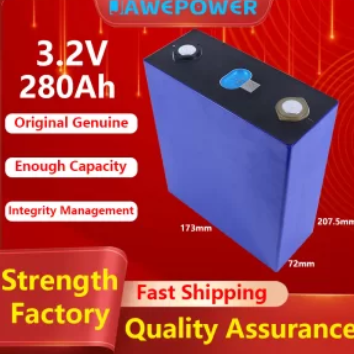Jawepower’s LiFePO4 prismatic cells demonstrate the company’s technical expertise in developing stable, high-density power sources suitable for demanding applications across multiple industries. The product line includes specialized variants like the EVE LiFePO4 battery series, such as 3.2V LiFePO4 prismatic battery, engineered to meet rigorous performance standards while maintaining exceptional safety characteristics.

Superior Thermal and Chemical Stability
Jawepower’s LiFePO4 prismatic cells benefit from the intrinsic stability of lithium iron phosphate chemistry, which provides enhanced thermal runaway protection compared to conventional lithium-ion alternatives. The prismatic aluminum housing further reinforces structural integrity while facilitating efficient thermal management, allowing the batteries to maintain consistent performance even under high-load conditions. With voltage consistency across charge-discharge cycles, these cells deliver predictable energy output that system designers can depend on for critical applications.
Optimized Energy Density and Cycle Life
The LiFePO4 prismatic cells from Jawepower achieve an exceptional balance between energy density and longevity, with certain models reaching industry-leading capacity levels. The 230Ah variant exemplifies this capability, offering extended runtime without compromising the compact form factor characteristic of prismatic designs. The absence of memory effect and ability to maintain performance through partial state-of-charge cycling further enhance their suitability for renewable energy integration and backup power systems.
Customizable Solutions for Diverse Applications
Jawepower recognizes that different energy storage projects have unique requirements, and accordingly offers customizable LiFePO4 prismatic cell solutions. From the 62Ah compact configuration to the high-capacity 280Ah industrial-grade unit, the product range accommodates varying energy demands while maintaining uniform safety standards. This flexibility extends to specialized applications such as marine systems, off-grid power solutions, and large-scale energy storage, where Jawepower’s prismatic cells provide scalable, modular building blocks for complex power architectures.
Conclusion
The combination of robust chemistry, efficient prismatic design, and adaptable configurations positions these batteries as versatile components in the transition toward cleaner energy systems. By maintaining focus on both performance characteristics and environmental responsibility, Jawepower’s prismatic cell offerings provide system integrators and end-users with reliable power solutions that meet today’s energy challenges while anticipating tomorrow’s requirements.

